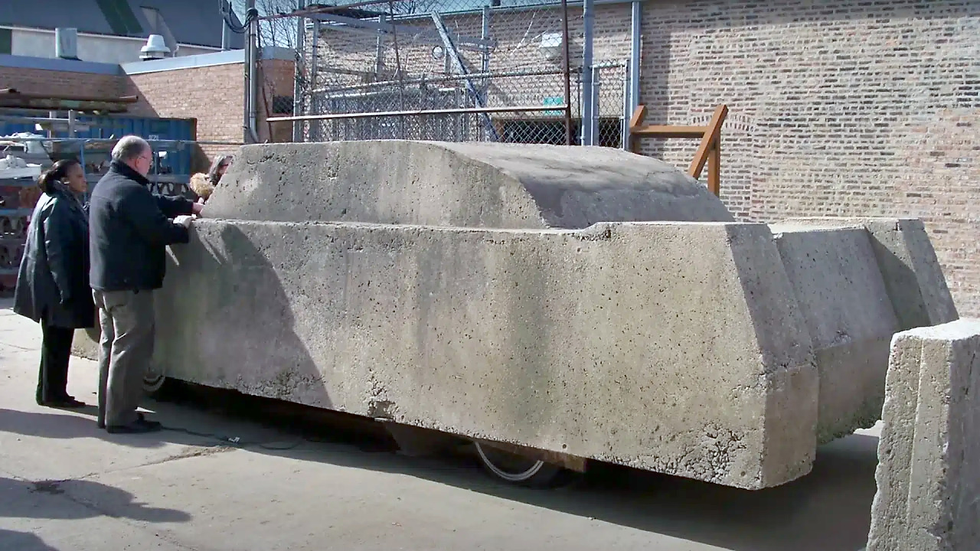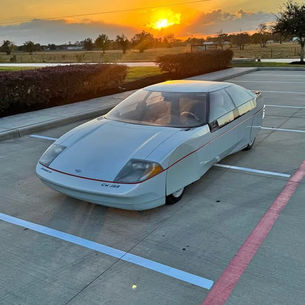1976 Maserati Medici II by ItalDesign
- Story Cars

- Feb 3, 2022
- 3 min read
The luxury super-saloon is nowadays considered a must-have model for most prestige manufacturers. But the legendary designer Giorgetto Giugiaro was working hard on perfecting a car that combined performance and luxury with four-door practicality back in the mid-70s.
In 1974, the tireless Giugiaro – fresh from penning Maseratis Ghibli, Bora, and Merak – began a project to design a four-door Maserati that combined the luxury of an American limousine with abundant power – the latter being notably absent in the 207bhp Quattroporte II of the same year. The philosophy of Giugiaro’s car was expounded in its name, ‘Medici’: inspired by the celebrated Florence family that had risen to fame in the 14th Century through a certain business aptitude and a love of culture and arts.
The Medici sat on an existing Maserati chassis and boasted a longitudinally mounted 5.0-liter V8 instead of the underwhelming 3.0-liter V6 used in the Quattroporte II. Inside, the car had seating for six – with four ‘living-room’ style chairs facing each other, giving the velour-lined interior an atmosphere reminiscent of a limousine, just as the design brief had specified. Giugiaro sought a ‘balanced and elegant shape for the car's body, taking cues from some of his previous work such as the Audi Asso Di Picche concept (with a design language that was also evident in the later B2 Audi Coupé – you may see some resemblance).
However, the outcome bore a bonnet too streamlined for the roofline, resulting in an oddly proportioned car – extremely un-Giugiaro-like, considering that his catalog raisonné includes the De Tomaso Mangusta, Iso Grifo, and BMW M1. Like many geniuses, Giugiaro is extremely self-critical, and even official documentation from the Italdesign styling house he formed in 1968 accepts the disappointments of the Medici’s styling.
Nevertheless, another trait of an artistic genius is persistence, which Giugiaro duly displayed in the years to come. Indeed, he brought the regrettable Maserati back into his workshop and set about creating the Medici II, ‘cutting and stitching’ the metalwork to correct the anomalous proportions of the 1974 Turin Motor Show car. While the stubby-tailed, two-box silhouette was retained, the bonnet line was raised to sit better with the perpendicular lines displayed elsewhere on the car, thus resulting in the pop-up headlights being exchanged for more conventional rectangular ones, between which a more conventional grille was also integrated. While his alterations all but put paid to the sporty character Giugiaro was so keen to achieve, a classier look was adopted and subsequently embraced by the Piedmont-born designer.
Reappearing in Medici II form at the 1976 Paris Motor Show, the car met a decidedly warm reception compared to its previous experience in Turin. The rear bench was swapped for a pair of armchairs, and, in keeping with the classical overtures, the velour upholstery was replaced by leather and briarwood. The sophisticated look was also applied to the interior; out went the rearward-facing pair of seats, but the limo-esque ambiance was preserved by two newly installed cabinets containing a minibar, refrigerator, desk, and file-holder. At the same time, a TV and a radiophone provided touches of modernity.
After the show, the Medici II made its way into the Louwman Museum (where it resides), but not before lending several of its styling cues to the 1977 Turin Motor Show Quattroporte III concept car and a subsequent production version. The third Quattroporte model was more successful than its flawed forebear, with one example put into presidential service: thus verifying its ‘businessman’s Maserati’ status.
Despite its ungainly appearance initially blemishing Giugiaro’s portfolio, the revised Medici is ultimately a rare insight into the determination of a character so talented. Itself going on to inspire one of the principle super-saloons, the Medici II can perhaps trace its offshoots not only to the modern Quattroporte but also the Rapides, Panameras, and CLS AMGs its grandchild does battle with. Meanwhile, its assiduous creator – deservedly awarded Car Designer of Century in 1999 – now has the opportunity to enjoy retirement. That’s not to say that he’ll take that opportunity, of course.
Source: Classic Concepts: 1976 Maserati Medici II | Classic Driver .... https://www.classicdriver.com/en/article/cars/classic-concepts-1976-maserati-medici-ii
Images: ItalDesign; www.classicdriver.com




















































Comments